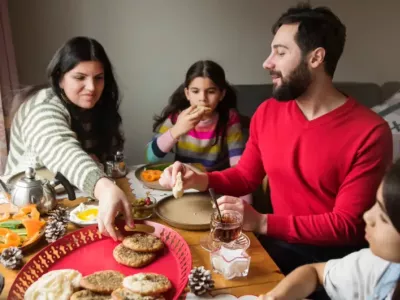Preventing intimate partner violence and gender-based violence: How Triple P can help

A global concern
Across the world there is growing concern about the harm caused by gender-based violence and intimate partner violence 1.
More than 1 in 4 women worldwide have been subjected to physical or sexual violence from a current or former male partner 1. Cyberviolence, including online threats, stalking, and harassment has extended the ways women are victimized. Canadian data suggest that a staggering 44% of women have experienced intimate partner violence over their adult life 2.
Violence occurs across all types of families. No woman is immune from gender-based violence, but some groups are more vulnerable than others, and some women may find it more difficult to access and receive support.
It costs everyone dearly
The toll of violence against women is paid by the victims themselves, the children who witness it, and those who care for them. In addition to the individual woman’s suffering, her physical and mental health difficulties dramatically increase costs in health, education, child protection, and lost opportunities. As a society we all pay the costs of intimate partner violence and gender-based violence 2. There is a need to allocate resources to implement evidence-based programs that can prevent intimate partner violence and gender-based violence, so that future generations learn about relationships based on consent, communication, and caring.
Canada takes action
One of the 5 pillars of canada’s strategy to reduce gender-based violence is prevention 3. At the heart of this approach is teaching young people how to foster healthy relationships. It is never too early to start communicating clearly, giving and asking for consent, setting and respecting boundaries, and speaking up when you see or experience violence 4.
Disagreement is common among all people. Siblings, friends, and parents are no exception. It’s natural that two people see things different ways. Healthy disagreement can expand our horizons. It only gets problematic when disagreement escalates into conflict.
How Triple P can help
Triple P is a suite of evidence-based programs developed over 40 years of research that have been implemented in diverse communities around the world to effectively help parents develop concrete strategies to face everyday challenges and extreme stresses in parenting. Embedded throughout all programs is the development of skills for developing and maintaining caring, safe relationships.
Triple P's five principles form a strong foundation for violence prevention:
- Providing a safe secure environment free from the threat of verbal or physical harm. Across all Triple P programs safety is the first priority. Children thrive and develop when their environment is safe and supportive.
- Encouraging a positive learning environment so the child can explore, make mistakes without fear of punishment, and develop life skills. Triple P programs help parents to create a safe space that encourages children to try new things and discover new skills.
- Guiding behaviour and responding to challenging behaviour so the child learns about establishing safe boundaries and calmly dealing with frustrations and disappointments. This involves the parent remaining calm and teaching the child to regulate emotions.
- Having realistic goals for oneself and for the child. Triple P programs set parents up for success by helping them to set goals that make sense for themselves and for their children.
- Taking care of yourself as a parent and setting an example of compassionate self-care. A key element of all Triple P programs is the idea that parents who take care of their own well-being are better able to care for their children. Women who have experienced violence may benefit from support in regaining confidence in themselves and maintaining the habit of taking care of themselves.
The Triple P suite of programs teach strategies to:
- Develop strong relationships with children. All parents can benefit from developing warm relationships with their children and enabling their children in turn to have healthy relationships. Parents show by the way they interact with others the way they address issues of gender, consent, and dealing constructively with differences.
- Set and maintain limits. Parents learn to set a few simple family rules that enable healthy interaction and apply to everyone, as well as ways to back them up in a calm and positive way.
- Guide behaviour and respond to challenging behaviour. Triple P teaches parents how to help their children learn self-regulation by effectively responding to challenging behaviours in a nonviolent manner.
- Express emotions and respond to strong emotions. Triple P programs (such as Triple P for baby, fear-less, and seminar) offer parents a chance to practice labeling and expressing emotions.
- Promote support-seeking and clear communication. Triple P programs (such Triple P for baby, family transitions, enhanced Triple P) encourage parents to develop and maintain healthy support networks in which they communicate effectively about their needs.
- Avoid escalating conflict. Triple P programs (such as Triple P 0-12, Teen Triple P, Stepping Stones Triple P, Family Transitions) explicitly address the risks of escalating conflict and teach strategies to avoid unhelpful escalation in interaction with children and adults.
Active skills training offers parents the opportunity to develop parenting routines and co-parent communication that is respectful and assertive, without resorting to harsh or coercive exchanges.
Across all Triple P programs, parents are invited to establish their own goals, depending on the child’s stage of development and needs. This allows parents to focus on the issue that is most relevant to their child.
Optimizing access and reducing stigma about help-seeking
Triple P programs are offered by diverse helping professionals in varied sectors including health, child development, child welfare and education. This offers parents multiple pathways to access this support.
Triple P offers a range of programs delivered through different modalities. Although all parents need some help and could benefit from learning Triple P strategies, they don’t all need the same amount of help. Some parents may get all they need from reliable websites. Others may learn enough by attending a single-session seminar. Other parents may benefit from 1:1 consultation about a single issue. Parents whose children are experiencing difficulties may find it helpful to attend a full course that teaches them a range of strategies and how to put them into practice. A minority of parents may be struggling with their own issues such as depressed or anxious feelings, anger management or unhelpful thinking that get in the way of using the parenting strategies they’re learning. In addition to face-to-face programs, Triple P also offers a suite of online programs that parents can complete on their own, at their own rhythm, either independently, or with the support of a trained practitioner.
Gender-based violence and intimate partner violence prevention can be addressed through programs explicitly designated as violence prevention. Additionally, support can be provided in a more flexible manner to parents seeking assistance with parenting, regardless of whether they have identified themselves as experiencing violence.
Triple P is a strengths-based approach that enables parents to develop strategies to help their children develop life skills to establish and maintain nonviolent relationships.
The Triple P suite of evidence-based programs is flexible and fits well with other services and initiatives to help the next generation to break harmful cycles of violence.
References
- World Health Organization (2022).Intimate Partner Violence. https://apps.who.int/violence-info/intimate-partner-violence/
- Cotter, A. (2021). Intimate partner violence in Canada, 2018: An overview. Juristat. Statistics Canada Catalogue no. 85-002-X.
- Government of Canada (2024, July 31). The National Action Plan to End Gender-Based Violence. https://women-gender-equality.canada.ca/en/gender-based-violence/intergovernmental-collaboration/national-action-plan-end-gender-based-violence.html
- Laforest, J., Maurice, P. & Bouchard, L M. (dir.). (2018). Rapport québécois sur la violence et la santé. Montréal : Institut national de santé publique du Québec.

